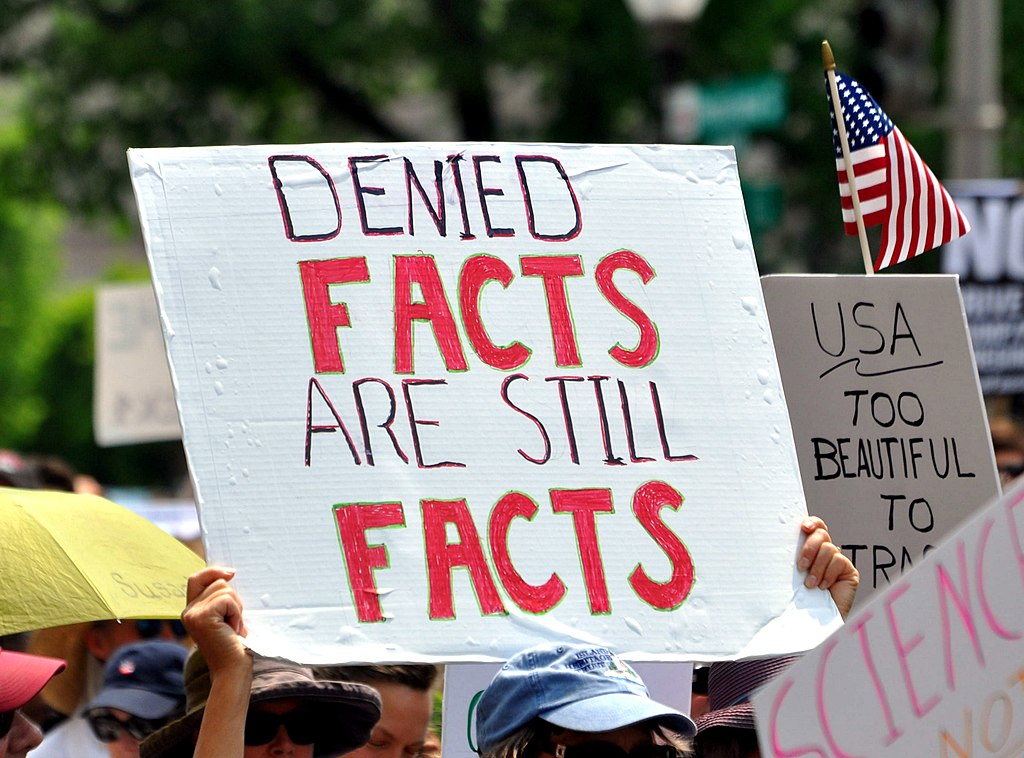Last December groups promoting climate change denial sponsored a two-day conference which brought together energy executives and lobbyists with Trump administration officials.
According to the conference’s agenda, which DeSmog has obtained exclusively, the participating energy and utility companies included Dominion Energy, General Electric, and Georgia Power. Officials from the Departments of Energy and the Interior were among the panelists.
The event, billed as a “State Energy Policy Summit,” was organized by the Thomas Jefferson Institute,* a member of the State Policy Network (SPN), a powerful group of think tanks pushing states to adopt conservative policies. Both the SPN and its ally the American Legislative Exchange Council (ALEC) are funded by an array of corporations, right-wing groups, and wealthy conservative donors that include brothers Charles and David Koch.
The conference, which took place from December 7-8, 2017 in Washington, D.C., was also sponsored by the Thomas Jefferson Institute and The Lynde and Harry Bradley Foundation — two groups that promote climate change denial — and the Consumer Energy Alliance, an advocacy group working on behalf of the oil and gas industry.
The December 2017 State Energy Policy Summit agenda. Click to view PDF.
Lobbying Opportunities
The conference placed in one room energy interests and the government representatives and agencies which they are currently lobbying.
The first panel dealt with offshore energy development. It featured speakers from the National Ocean Industries Association, International Association of Geophysical Contractors, and National Ocean Policy Coalition — three trade groups advancing the interests of the offshore and energy exploration industries. A fourth member of the panel was Tim Williams, deputy director of the office of external affairs in the U.S. Department of the Interior. Williams, a former Republican operative who worked on the Trump campaign, was appointed to his position by Interior Secretary Ryan Zinke.
Keynote addresses by U.S. Representatives David Rouzer (R-NC) and Bruce Westerman (R-AR) followed the panel. Over his brief Congressional career, Westerman has received a total of $114,450 in campaign contributions from the oil and gas industry, one of the top industries throwing support behind him. Rouzer, between 2011 and 2018, has netted $91,490 from the industry.
Congressional records indicate that the energy participants on the offshore panel are presently lobbying both the Interior Department and Congress. National Ocean Industries Association is lobbying the Interior Department on various matters concerning offshore energy, including the Outer Continental Shelf.
Similarly, the International Association of Geophysical Contractors is lobbying the Interior Department and the House of Representatives on “[I]ssues impacting offshore seismic activities.” It is also lobbying Congress on H.R. 3131, or the SEA Act (Streamlining Environmental Approvals Act), which Representative Rouzer has co-sponsored. The bill seeks to ease environmental approval processes for offshore exploration in ways that amend current protections for endangered marine mammal habitats.
HBW Resources, the lobbying firm behind the Consumer Energy Alliance, one of the conference’s sponsors, is currently lobbying the House of Representatives on behalf of the National Ocean Policy Coalition.
A second panel, on electric power, included representatives from Dominion Energy, Georgia Power, and the Nuclear Energy Institute, the nuclear industry’s main trade group. They were joined by Sean Kennedy from the State Government Leadership Foundation, a group which advances Republican candidates and various conservative causes. Though the group keeps its funding sources under wraps, ProPublica reported in 2013 that past donors included ExxonMobil and the Edison Electric Institute.
Dominion was represented on the panel by Bill Murray, a long-time Virginia lobbyist for the company. At the time of the panel, Murray, a Democrat, was serving on newly elected governor Ralph Northam’s transition team. Murray was unavailable for comment, but a spokesperson for Dominion told DeSmog:
“Bill attended the meeting because he was invited. He is a sought-after speaker on several energy policy topics as well as health care. He talked about emissions-free, carbon-free nuclear power and its role in meeting the country’s electricity needs. Again, Bill speaks to a myriad of organizations about various policy topics. He was invited, he accepted. Along with all the other presenters.”
Dominion is linked in other ways to the Thomas Jefferson Institute, one of the conference’s sponsors. Two of its lobbyists in Virginia, James Beamer and John Rust, serve on the institute’s board of directors.
Another conference panel featured Andrew Black, president of the Association of Oil Pipelines; Chrissy Borskey, a lobbyist for General Electric; and Doug Little, deputy assistant secretary for intergovernmental and external affairs at the U.S. Department of Energy. General Electric is currently lobbying the Department of Energy on a variety of issues, including energy infrastructure, energy appropriations, and renewable energy standards.
The Departments of Energy and the Interior did not respond to requests for comment. General Electric and Georgia Power also did not respond to similar requests.
Sponsoring Climate Denial
The Bradley Foundation, one of this conference’s sponsors, has for years been at the forefront of a sophisticated apparatus that funds climate denial, what Drexel University sociologist Robert Brulle calls the “climate change countermovement.”
Internal Bradley Foundation documents, hacked and released in the last 18 months, support this characterization, revealing that the group contributed millions of dollars to organizations that deny climate change or obfuscate the established science behind it.
In recent years this funding went to such groups as the Heartland Institute, the Competitive Enterprise Institute, and the Manhattan Institute for Policy Research, which a Bradley Foundation memo described as the three “best” organizations in the “energy and environment component.” The foundation also donated to the CO2 Coalition, the George C. Marshall Institute (which shut down in 2015 and transferred its climate research to the CO2 Coalition), and the Thomas Jefferson Institute — another of the conference’s sponsors.
Based in Springfield, Virginia, the Thomas Jefferson Institute promotes market-based policies that limit government intervention and instead focus on “personal responsibility.” Its Environmental Stewardship program is headed by David Schnare, former general counsel of the coal industry-supported Energy & Environment Legal Institute and a Trump transition team member, who was engaged in protracted legal pursuits of climate scientists.
Under Schnare, the Environmental Stewardship program at the institute sowed doubts about climate change and critiqued the U.S. Environmental Protection Agency and its renewable energy mandates.
The conference’s third sponsor, the Consumer Energy Alliance, has been in recent years actively promoting the gas and oil pipeline buildup throughout the country. The group is funded by various fossil fuel producers, pipeline companies, industrial energy users, and utility trade groups, including such major players as Dominion, General Electric, Spectra Energy (now Enbridge), and Edison Electric Institute.
At times, the alliance used controversial tactics, such as when it submitted letters of support for Spectra’s NEXUS pipeline in Ohio — letters signed by people who denied signing them. One of the letters was signed by a man who had been dead for 18 years.
*Updated 1/26/2018 to reflect that the conference was organized by the Thomas Jefferson Institute, which is a member of SPN, rather than by the SPN.
Main image: A sign about climate denial at the April 2017 Climate March. Credit: Edward Kimmel, CC BY–SA 2.0
Subscribe to our newsletter
Stay up to date with DeSmog news and alerts







